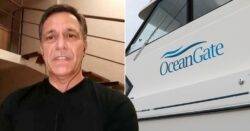Guillermo Söhnlein continues to express his admiration for the late OceanGate chief executive Stockton Rush (Picture: BBC/AFP/Getty)
The co-founder of OceanGate, the company behind the Titan submersible that imploded last month, is planning to send 1,000 people to live in the acid clouds above the surface of Venus.
Guillermo Söhnlein, who passed control of the company over to Stockton Rush in 2013, described the project as less ambitious than SpaceX’s plans to start a colony on Mars.
Rush was one of the five passengers who were killed on board the Titan when it suddenly lost pressure while travelling to the wreck of the Titanic.
He was heavily criticised in the aftermath of the disaster for his cavalier attitude towards safety regulations, and OceanGate suspended all its operations on July 6.
However, Söhnlein said he wanted to channel Rush’s philosophy of placing innovation above anything else for his voyage to Venus.
Speaking to Insider, he said: ‘I don’t think that should have a negative connotation because you could almost argue that it’s a critical element of humanity moving forward.
‘If we didn’t have people that like this, we’d probably all still be in caves.’
With entrepreneur Khalid Al-Ali, he has co-founded a venture studio named Humans2Venus to promote the planet as a target.
Venus, the second planet from the Sun, has been called Earth’s twin as it is similar in size (Picture: Getty Images/Science Photo Libra)
While Venus is the hottest planet in the solar system, with clouds composed of sulphuric acid, the business website suggests it ‘may be the only non-Earth location in the solar system where humans may be able to exist on a long-term basis’.
Gravity is roughly equal to Earth, and atmospheric pressure is also almost equivalent to Earth’s. Temperatures, the website says, sit at a pleasant 25C.
The problem is that none of the statistics above apply to the surface of Venus – rather, they describe the conditions 50km above ground level.
That would require not only designing a means of transporting people 47,338,000 miles to get there, but also designing a station that could float in the planet’s acidic clouds and absolutely not crash to the surface, where it is hot enough to melt lead.
Guillermo Sohnlein, left, with fellow OceanGate founder Stockton Rush, centre, and Explorers Club member Ross Von Burg (Picture: OceanGate)
Söhnlein says he is optimistic that such pieces of technology could be created within the next three decades.
‘It is aspirational, but I think it’s also very doable by 2050,’ he told Insider.
Not all of Stockton Rush’s friends share Söhnlein’s admiration for the late businessman’s attitude towards exploration.
Speaking to 60 Minutes Australia earlier this month, submarine operator Karl Stanley suggested he thought Rush was willing to risk his own life and his clients’ lives in order to ‘go down in history’.
‘He quite literally and figuratively went out with the biggest bang in human history that you could go out with,’ he said.
‘Who was the last person to murder two billionaires at once, and have them pay for the privilege?’
Get in touch with our news team by emailing us at webnews@metro.co.uk.
For more stories like this, check our news page.
Guillermo Söhnlein says he still admires his late colleague Stockton Rush’s attitude towards innovation.




